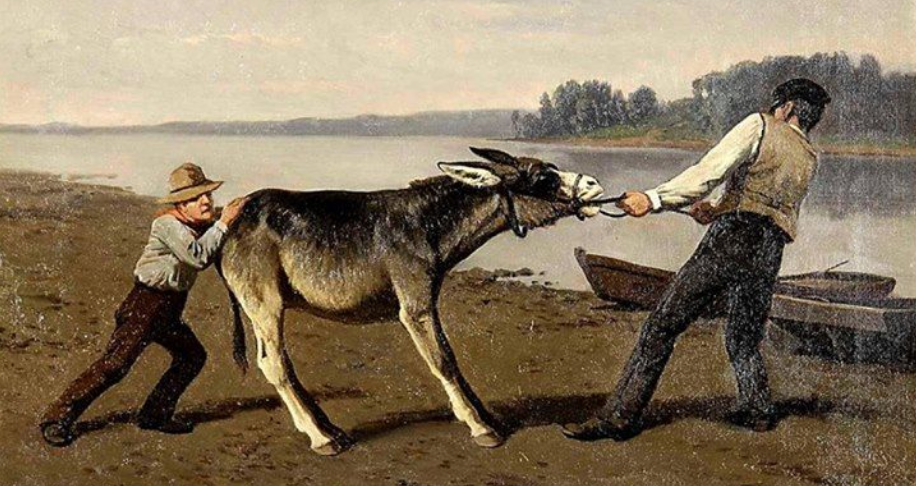
(For the audio version of this blog, please visit: http://brothersinchristcmf.org/wp-content/uploads/2023/02/Mass-Blog-for-the-6th-Sunday-in-Ordinary-Time-2023.mp3)
Our most popular songs celebrate humanity’s most comfortable virtues—love, chief among them. Our sins don’t get as much poetic attention because, let’s face it, they don’t feel good. But leave it to Groucho Marx, one of the 20th Century’s great comedian philosophers, to poke fun at us from the grave. Our sin? Not owning some of those uncomfortable but still fitting words satirists like Groucho attached to us. Take obdurate, for example.
A recent documentary pointed out that Groucho was a fan of vocabulary. He even performed songs from Gilbert & Sullivan operettas showcasing words like “obdurate” to illustrate the human condition. Groucho once interrupted his interpretation of “The Mikado” to ask his audience what obdurate means. Luckily for them, someone correctly answered “stubborn.” He thus deemed them worthy to hear the rest of the song.
Yes, we ARE obdurate in not returning God’s love the way he gives it to us: unconditionally. We’re stubborn as a mule. Scripture often refers to such people as stiff-necked. It makes one wonder why our Creator chose to suffer for His art by giving his human creatures free will.
We use it as license to twist and torture our Creator’s unconditional love until it fits into the mold WE fashion for it. We obdurately enslave ourselves to studying the letters of God’s laws while remaining strangers to their Spirit. Yet our God keeps giving us second, third and fourth chances to mature, master and return His love in-kind.
Through Sunday’s gospel reading (Mt 5:17-37), Jesus chides us for the ways we misinterpret the poetry of His Father’s Laws.
Take the anti-killing commandment.
We might not kill the body of someone we despise, but we have no compunction about attacking that person’s spirit—using words as weapons to mortally injure them.
How about the law against adultery?
We might not physically touch the body of someone for whom we lust, but in our heart we might objectify it and therefore confuse cold carnal attraction with the warm spiritual love uniting us with our Father.
Bearing false witness?
We might not tell lies about someone to hurt them, but we do like to sculpt untruths out of whole truth—thereby diminishing others while magnifying ourselves.
We obdurate souls cling so stubbornly to our false truths that we often confuse sin with salvation. But as the prophet Sirach tells us in Sunday’s first reading (Sir 15:15-20), God gave us the freedom to grasp the spirit of His commandments, so we stiff-necked beasts of burden can free ourselves from the yoke of our own stubborn slaveries.
If you trust in God, you too shall live; he has set before you fire and water; to whichever you choose, stretch forth your hand.
But in our obdurate way, like a pyromaniac, we’re tempted to grasp for fire’s beauty while ignoring its destructive heat. We take for granted water’s ready availability to quench the fire, but only reach for it after the damage is done.
Paul puts our obduracy in the proper context because he was the master of this art before his Road to Damascus conversion. He came to understand that the rulers of his and every age are called to cultivate a certain wisdom to make the human spirit holy. The Spiritual Ruler who took on our flesh modeled for us the mature brand of wisdom intended for our inheritance.
Not a wisdom of this age, nor of the rulers of this age who are passing away. Rather, we speak God’s wisdom, mysterious, hidden, which God predetermined before the ages for our glory, and which none of the rulers of this age knew; for, if they had known it, they would not have crucified the Lord of glory. (1 Cor 2:6-10)
“They” are the obdurate stiff-necked mules who, by killing the one born to save us, took hold of a fire that branded into our hides the painful reminder of our slavery to humanity’s original sin. However, our Father’s continuous unconditional love also reminds us we can still rise above our own lowly unrequited brand. Reaching out for our Father’s brand requires grasping it and obdurately offering it to each other.
–Tom Andel